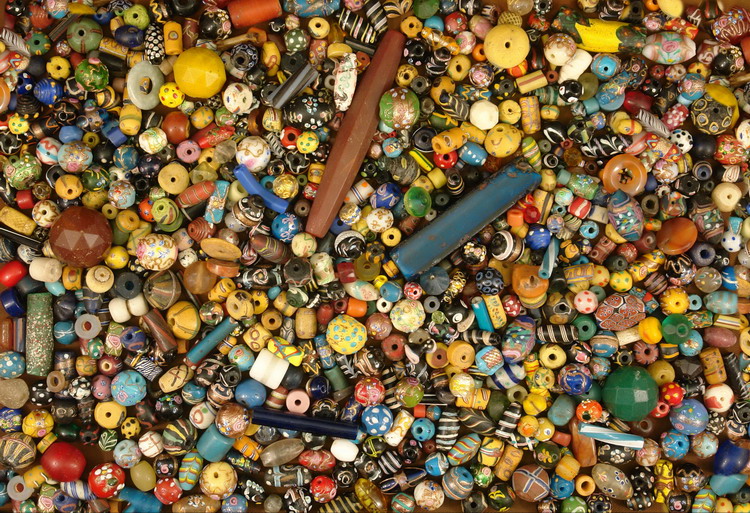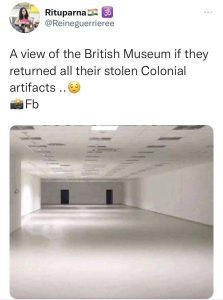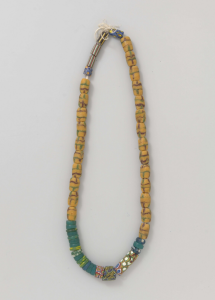
Decolonizing my research?
It has become a popular claim that the British Museum would be empty if they were to return all the stolen objects in their collection. This joke is something that has become much more prevalent in the last couple of years or so and it indicates a social need from the public for museums to actually start dealing with their colonial pasts. Of course the British Museum is not the only museum in the world that has to deal with this push towards a degree of ‘decolonization’ of collection and practice.  There are many museums in Western Europe and North America that are faced with the same demands from the public.
There are many museums in Western Europe and North America that are faced with the same demands from the public.
One of the most important ways the museums go about decolonizing themselves is by returning cultural objects and conducting research into the provenance of their collections. Some time ago I wrote about this practice and tried to show the inherent problems that are part of this process, both in national legislation as well as museum practices. One of the reasons I am interested in this topic is because of a personal stake in this process. For the purpose of writing my thesis I am conducting research into the provenance of necklaces coming from the African continent. This makes me an intrinsic part of the, colonial system that, in my earlier post, I was so critical of.
So it is important to have a critical look at the research that I will be conducting and how my research and me personally can work towards a more decolonial approach to the topic of provenance research.
Who am I?
This has been the most important question for me to answer, and as a result to help me understand why I can conduct research into the provenance of African necklaces and beads.  This is not a question that I have finished, or that will likely ever be fully answered but by understanding myself I can better understand what I am doing as well.
This is not a question that I have finished, or that will likely ever be fully answered but by understanding myself I can better understand what I am doing as well.
The reason why I confronted myself with this question is because of what Mbembe (2016, p. 34) describes as seeing ourselves clearly. He states that we can decolonize our practices by understanding ourselves in relationship to others. So by knowing who I am as a person, as a researcher, I will also be able to better understand who I am in relation to others.
This to a degree is also a challenge to my epistemology, which is at the basis of the decolonization (Grosz-Ngaté, 2020, p. 698). Since I have been taught, academically, at Leiden University, I am used to certain approaches to the creation of knowledge and therefore might not always be the best person to answer particular research questions. My role as a ‘specialist’ on a specific topic can be, and sometimes should be, critically reviewed. Within my research I will be taking on the role of a specialist researcher that leads and conducts the research, but that will also mean personal scrutinization, not just on the amount of work that I have done, but on what type of information I have consumed in order to become the so-called ‘specialist’. Furthermore, I have to become aware of where my knowledge is lacking and then not instantly assign that lack of knowledge to the non-existence of it. I should be open to learning from the people that are around me and be able to accept other views on the same topic, even if they do not agree with mine. This would help me prevent falling into the ‘double-crisis’ termed by Ndlovu-Gatsheni (2018, p. 7).
Of course one approach to this could be that I work in close relation with the communities of origin, as is often done in provenance research. Yet this would, according to Mignolo (2009, p. 20), not be enough, as this could just be seen as ‘working with the locals’. All three papers about epistemologies and decolonization not only call for the recognition that ‘western’ researchers have for their own positionality, but also point to the need to systematically change how we approach research into Africa.
This for me is the most challenging aspect of decolonizing my research. Of course I am willing to change the narrative, called upon by Grosz-Ngaté (2020, p. 712), yet I find it difficult to do in the research that I will do.
What I bring to this research.
So why would I still be doing this research? That is a fair question to ask and an important one at that. What is at the basis of my answer to this is both the lecture that Achille Mbembe gave at Duke University in 2017 and part of his paper in 2016. In both these publications Achille Mbembe speaks about a more communal form of knowledge creation. In his lecture: Future Knowledges and the Dilemmas of Decolonization he talks about a structure called horizontal learning and the need for a multivocality in the social sciences (Duke Franklin Humanities Institute, 2017). This, according to Mbembe, is necessary because of the fracturing of the sciences, which by its increasing amount of specializations create little space for broader interpretations of the topic. Furthermore, in his 2016 paper, Mbembe also elaborates on this idea, by introducing the idea of the pluriversity. Where academics “horizontal strategy of openness to dialogue among different epistemic traditions”, which again refers to being open about the understanding and knowledge that are brought by the people that you work with (Mbembe, 2016 p. 37).
These approaches to the epistemological challenges that were needed according to Ndlovu-Gatsheni (2018) and Grosz-Ngaté (2020), can be found within the idea of the pluriversity and multivocality, This, of course does not immediately mean that by just thinking about this it will be good enough, but I should be applying this approach from the set up of my research onwards, which makes it impossible not to implement it. A great example of how this could be done is by Pearlstein et al. (2023), whose research team included academics and a representative of the Yup’Ik people, who have researched and published on the provenance of Yup’Ik masks in the Vatican museum.
What is also important is my knowledge about African beads, their production methods, histories etc. This may sound somewhat egotistical, however I think it is very important to see it through the lens of the pluriversity (Mbembe, 2016 p. 37). Because there are just a few people in the Netherlands that have knowledge about African beads, their production methods, histories etc. I am able to bring this to the pluriverse system within my research. That also means being able of the system and open to other epistemologies, but I feel like I can actually bring something meaningful as well.
Furthermore, my physical location also helps in the research into the provenance of African necklaces. Due to the fact that I live in the Netherlands I am in an extremely good position to travel to the museums that have African necklaces in their collections. Something that might be more expensive and more inaccessible for people from the continent. All this, however, should be taken with some degree of understanding that this is at least in my personal interest. Hountondji (2009 p. 128) warns of this problem, where the interests of western academics are the starting point of research, while African interests are left by the wayside. Yet I do think that provenance research takes up an interesting spot in this debate, where it is in the interests of both researchers and people in Africa as well as this “West”. I do think that because of this while taking this warning as a point towards making the research process more accessible I am not entirely working solely on my own interests (however it did start the research of course).
The research.
What this means for my research is difficult to say. In a practical sense. Due to the fact that it is a master thesis and therefore not as elaborate as other provenance research projects that often span years. It is therefore difficult to establish the grand systems discussed above, yet that does not preclude me from establishing some degree pluriversity. I hope to achieve this by incorporating not just academic sources but be open to a larger array of sources. This also means that there is a greater chance that sources from the continent can actually be used as well.
Lastly I feel like I might have to steer away from the idea that I am ‘decolonizing’ my practices. If I see it in that regard it becomes some sort of badge of honor, instead of it actually just being the norm for what I am supposed to be doing. This is somewhat in line with Olúfémi Táiwò’s (2022 p. 15) thinking against decolonization, where he sees it becoming a buzzword and therefore losing its meaning.
I do not agree that we should completely stop being critical about ourselves as researchers and definitely do not say that decolonization should be left for what it is, as Táiwò does (2022). Yet at the same time, perhaps we actually should stop referring to it as decolonizing a practice and instead just expect better from researchers.
In chapter 4 of his book, Táiwò discusses African agency, which in my opinion, could be achieved by a more pluriversal approach to research. It allows for more agency to be taken by previously marginalized peoples that often are not or barely represented in this type of research. Again on a smaller scale like my thesis it might be more difficult to implement
I want to reiterate that I am by no means a perfect researcher and will, most likely, by no means incorporate all that laid out here in my own research. Yet thinking more about it has helped me better understand the strengths and weaknesses of the research that I am conducting.
Bibliography
Duke Franklin Humanities Institute. (2017, September 20). Achille Mbembe: Future Knowledges and the Dilemmas of Decolonization [Video]. YouTube.https://www.youtube.com/watch?v=Qa5NUW7aQAI&t=1675s
Grosz-Ngaté, M. (2020). Knowledge and Power: Perspectives on the Production and Decolonization of African/ist Knowledges. African studies review, 63(4), 689-718. doi:10.1017/asr.2020.102
Hountondji, P. J. (2009). Knowledge of Africa, Knowledge by Africans: Two Perspectives on African Studies. RCCS Annual Review, 1, 121-131. DOI: 10.4000/rccsar.174
Mbembe, A. J. (2016).Decolonizing the university: New directions. Arts and humanities in higher education,15(1), 29-45. DOI: 10.1177/1474022215618513
Mignolo, W. D. (2009). Epistemic Disobedience, Independent Thought and De-Colonial Freedom. Theory, Culture & Society, 26(7-8), 1-23 DOI: 10.1177/0263276409349275
Ndlovu-Gatsheni, S. J. (2018). Seek ye epistemic freedom first. In S. J. Ndlovu-Gatsheni (ed.) Epistemic freedom in Africa (pp. 1-41). Routledge.
Pearlstein, E., McIntyre, C. & Pandozy, S. (2023). Central Yup’ik masks in the Vatican Museums; indigenous American heritage in European museums. Museum Management and curatorship, (1990), 1-23. https://doi.org/10.1080/09647775.2023.2188479
Táiwò, O. (2022). Against Decolonisation: Taking African Agency Seriously. Hurst Publishers.
Leave a comment
You must be logged in to post a comment.